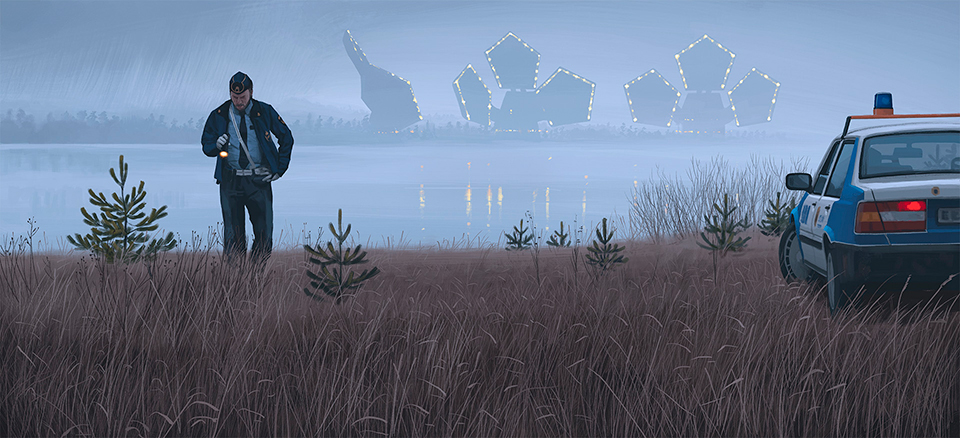We had our annual DSET training on my second week of work. We all had to board a coach and ride about an hour out of town to the DSET training ground, which is really just a big empty department store with lots of fake merchandise in it. It’s the only building in a four mile radius. There was a line of artificial wind makers to the north of the building and an obstacle course right out front. Someone had hung banners around the place: An unsealed door is an open door! A DSET without a bungie cord is a lost DSET! And, best of all: Remember the V’s: Visory Protection, Vectorial Awareness, Vestibular Reinforcement!
In the morning, we attended seminars with staff from a golf course and the employees (including the manager) of Jupes, the department store my then girlfriend shopped at. The seminar instructor was a cheery man who made liberal use of his pointer. He taught us how to treat a flesh wound and the basic mechanics behind the DSsecuritytech.
In the afternoon, we had a series of simulations to carry out, such as lock-down procedures and basic rescue missions. They wrapped us in safety clothing and turned on the wind makers for this. The air filled with sand in 7.3 seconds. We were given ten minutes to secure the place and do a brief register. Every piece of merchandise destroyed lost us points.
As a bonus round, we were made to trek out into the storm and save an ‘injured’ team member. An employee from Jupes failed to secure her visor and lost an eye.
An alright, but not yet great extract from my Mars Tennis story.
How to outline a story with five sentences.
Some people like to outline, some don’t.
I’m in the former. This outlining method enables me write good first drafts quickly and painlessly. Some may find it too prescriptive. That’s fine. That’s good. We’re all different and we can all live, arm in arm, together.
Even if you are a pantser or don’t outline, I would encourage you to try this method if you’re stuck. It takes ten minutes and the return is massive.
*
Firstly, we need an outline sentence, so what your story is about overall. No names, just background and the main ‘want’ of the protagonist. So:
English teacher falls for step daughter.
One-legged whaler captain hunts white whale.
Two tramps wait for friend.
That’s easy. This and perhaps what you think your story should be about should be sticky-noted to your pc at all times, as a guidepost to help you steer.
With this in place, we can expand our general idea into a paragraph of five sentences. I believe a story should be a series of bad things occuring to a single character, until that character either ‘wins’ or ‘loses’. Here’s what each of the sentences should detail:
- The general background of the story, the setting, the character, i.e. the stasis of the story. E.g. Dave wants a boyfriend.
- The beginning of your story until the first ‘bad thing’ happens. E.g. Dave falls in love with Derek from work, but finds Derek is taken.
- Now the characters reaction to the first ‘bad thing’, and then the second ‘bad thing’. E.g Dave decides to break up Derek’s marriage by framing Mark (Derek’s husband) for the murder of Derek’s cat, but then Dave gets caught by Mark and kills him.
- Same again, until the third ‘bad thing’ which forces the ending. E.g. Dave goes out to the seaside to try and dispose of Mark, but then gets caught by Derek.
- How the story is resolved. E.g. Derek kills.
What I find makes this outlining technique particularly effective is if the second and third bad thing are caused by the protagnist. So in this example, bad thing two is caused by Dave killing the cat. Then bad thing three is caused by Dave’s reaction to bad thing two.
From here I would make a scene list, so: Dave meets Derek. Dave finds out Derek has a husband. Dave sees the cat and decides to kill it. Dave breaks in, kills the cat in the kitchen, then Mark comes in. Discussion with Mark. Fight with Mark. Driving Mark’s body to the seaside. Getting caught by Derek. Gunfight. End. Then I would simply write out each of those scenes and tick them off as I go.
Now this is ideal for a short story, but perhaps a bit lacking for a novel. You may, for bigger projects, decide to turn each of these sentences into another five sentences or do an outline for each character, until you’ve got a greater number of scenes or the story is clear in your head.
What I like about this method is that it makes plotting very very easy. It gives you a plan for the next few writing sessions and enables you to imagine the story as a whole. Most of all, it helps you envision the ending and know the major points to get there. This is vital. It may be subject to change, sure. It may not be for everyone, sure. But it does work for me. The next time you’re stuck perhaps you should try it.
_________
This method was not thought up by myself. It’s stolen. More information can be found over at: http://www.advancedfictionwriting.com/articles/snowflake-method/
He goes into a lot more detail about character bios and stuff like that. His outlining method is much much larger than mine, and would take potentially a month. The method I have put up top has helped me produce a lot of stuff in the past few months. Sharing is caring and all that.
